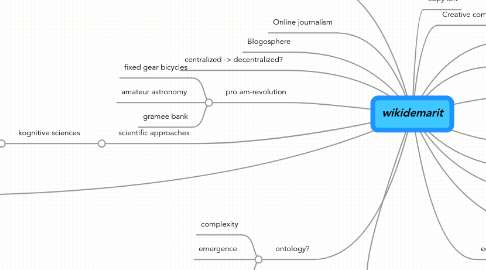
1. politics
1.1. open politics
1.1.1. free software movement
1.1.2. open content movement
1.1.3. open decision making methods
1.1.4. whats the relation to open source politics? how do these differ
1.1.4.1. participatory democracy
1.1.4.2. deliberative democracy
1.1.4.3. e-democracy
1.1.4.4. netroots
1.1.5. open politics aims to enable the casual user, critic, journalist, voter to examine and dissect positions taken by advocates and candidates
1.1.6. exploits mass peer review in ways that may resemble open source software, open content and reality game shows
1.2. wikidemocracy
1.2.1. undefined
1.2.2. computerised
1.2.2.1. internetised
1.2.3. wikiparty
1.2.3.1. wine and apples
1.2.3.2. political broilers?
1.2.3.2.1. not if broiler means a young politician trying to battle his way up the party ladder
1.2.3.3. open doors
1.2.3.4. not your normal party with juridicial structure
1.2.4. egalitarian?
1.2.4.1. whats this?
1.2.4.2. literally demo-cratic
1.3. not like this
1.3.1. old democracy
1.3.1.1. campaings, balloons and banners
1.3.1.2. representatives
1.3.1.3. political broilers
1.3.1.4. coffee and buns
1.3.1.5. closed doors
1.3.1.6. old farts
1.3.1.7. enabling advocates or candidates
1.3.1.8. big money
1.3.1.9. actual meritocracy
2. ontology?
2.1. complexity
2.2. emergence
2.3. networktheory
3. pro am-revolution
3.1. fixed gear bicycles
3.2. amateur astronomy
3.3. gramee bank
4. Online journalism
5. centralized -> decentralized?
6. wikipedia
7. participation is 'open', everyone can join?
7.1. open = decentralized = distributed = bottom-up
7.2. closed = centralized = hierarcial = top-down
8. Blogosphere
9. scientific approaches
9.1. kognitive sciences
9.1.1. distributed koginition
